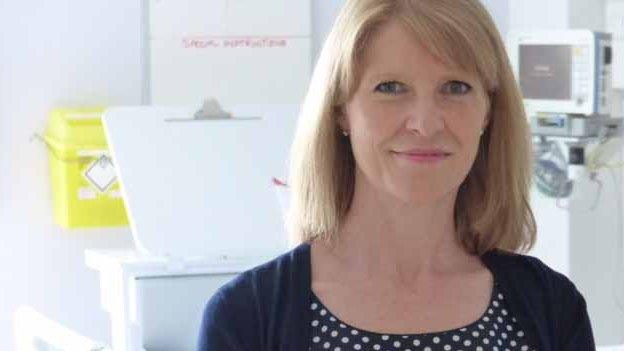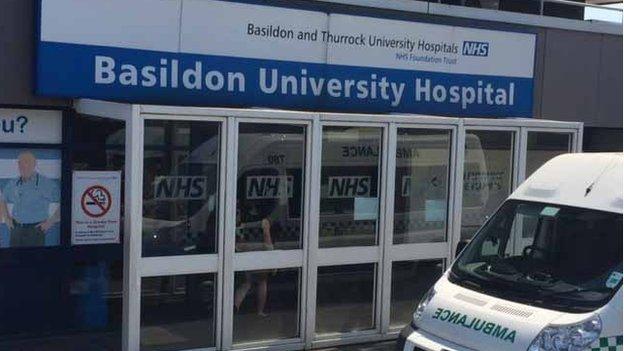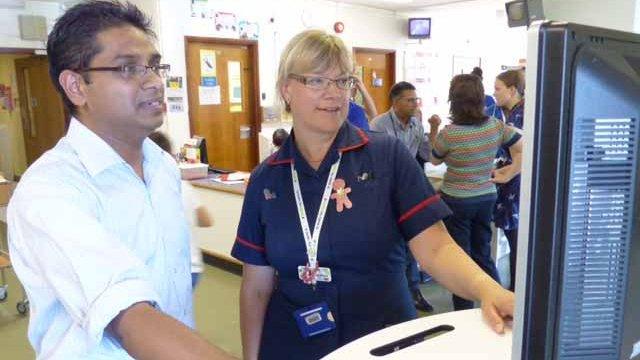The secret to transforming a failing hospital
- Published

Babies who have been born in the hospital's maternity unit
Each morning the staff of Basildon University Hospital gather in the canteen to discuss the pressing issues of the day.
It is open to anyone and on the morning I was there there were about 40 people attending - a combination of doctors, nurses, admin staff and managers. The key discussion was around a lack of available beds.
But despite the concerns, there was a definite spring in the step. The week before the hospital had been publicly praised by Health Secretary Jeremy Hunt for its remarkable turnaround.
Last July Basildon and Thurrock University Hospitals NHS Foundation Trust was part of the first wave of 11 to be placed in special measures.
A year on and it is a completely different situation.
The trust has been given a clean bill of health following a good rating by the Care Quality Commission. Its maternity unit became the first in the country to get an outstanding grade.
Tipping point
Like any journey, there has to be a start. A tipping point.
For Basildon, which is the trust's main hospital, it wasn't being place in special measures. It came nine months earlier with the death of a 10-year-old girl.
The young patient suffered an epileptic fit and the drugs she needed were out-of-date.
It was 5.30pm, but the consultants were not on site as they finished at 5pm.
The medics available were unsure what to do and the drugs were not given to her. If a consultant had been there, they probably would have been given.
"We don't know if the drugs would have saved her, but the care was not good enough," says hospital chief executive Clare Panniker.
"I'm a mother and so are many of the staff. I think it really hit home that we had to change." And so they did.
Good leadership

Chief executive Claire Panniker is a regular presence on the wards
But how? Special measures involves being buddied with a well-performing trust - London's Royal Free in this case - as well as regular contact with an external improvement director.
No doubt this has helped, but the belief at Basildon is that the turnaround is largely their own work.
The obvious answer to the question - and it was a point made by the health secretary - is that excellent leadership has been key.
He praised the hospital's chief executive for her work since taking up the reins in September 2012.
Talking to staff, the most frequently used word to describe her is visible.
The morning meetings - known as Stepping Up - are an illustration of this.
Ms Panniker - and other board members for that matter - are also a regular presence on the wards, spending time with staff and patients to find out what is happening on the front-line.
Governance structures have been overhauled and feedback from patients encouraged.
Many departments, for example, have notice boards asking for comments and patients and carers are invited to board meetings to tell their stories.
Investment

Basildon Hospital was one of the first wave of hospitals to gain foundation status
But better leadership is only part of the story. Money has also played a part.
Over the last 18 months an extra 240 clinical staff have been recruited - mostly nurses - increasing the headcount by 12%. This is costing the trust an extra £1m a year.
Investment is also being made in the buildings. Some of it is simple, low-cost: a dementia ward has had its bays painted to help patients find their way around.
But other projects are on a grander scale with major redevelopments of endoscopy, radiology and paediatric departments in the pipeline.
This, of course, is having an impact on the budget.
Capital reserves are being used for the redevelopments, but last year the trust finished the year £9m in the red and this year a £6.5m deficit is forecast. This was after years of breaking even or surpluses.
Ms Panniker says: "We've had to invest to improve the quality of care, but plans are in place to recover that in the coming years. Through better procurement we can save £4m and electronic records £1m."
Impact on staff

This combination of good leadership and investment has had a noticeable impact on the people who work there.
Jane Gilby, senior sister on the Kingswood ward, which specialises in dementia patients, says: "When you see things happening, even just little things like the painted walls, it gives you a lift.
"Sometimes you can't see the wood for the trees, but then you realise things can be improved."
But perhaps where the transformation is more noticeable than anywhere else is in the paediatrics department, which is where the 10-year-old girl died.
Consultant Sasanka Karunaratne was a trainee at Basildon from 2008 to 2010 and returned last summer just as the trust was going into special measures.
"People said to me 'don't go there', but I knew the potential it had. It was a completely different place. There are consultants here until 10pm now and the systems they had in place were working.
"I wasn't here when the girl died, but I know about it. It was a turning point."
Results
Ask patients what they think and the answer is understandably positive.
Mark Curtis, 52, has spent the last three years in and out of Basildon following a triple heart bypass, which was followed by a stroke and diagnosis of diabetes.
"It has definitely got better. The staff have more time and the caring attitude shines through.
"There are sometimes frustrations, waits that go on too long, but I must say it is a really good hospital."
His view is echoed by surveys with the latest poll of inpatients finding 94% were likely or extremely likely to recommend the hospital.
That is not to say there are not areas that need improvement.
The CQC may have given the trust a good rating, but it still highlighted several issues, including the management of medicines and infection control. Staff, the regulator said, could also appeared "rushed at times".
The secret of success
But for all the plaudits for the measures that have been taken it is impossible to get away from the fact that there is some other, underlying factor that has also been important in Basildon's recovery.
Talking to staff it is clear that even through the bad times the faith remained strong.
It is something even Ms Panniker admits. "Could you take all the things we have done and make them work elsewhere? I don't know."
So why not? You have to go back a decade to find the answer.
Basildon was part of the first wave of trusts given foundation status, which was awarded at the time to the elite performers in the health service. It was, it seems, a good hospital that had lost its way.
Or, in other words, the foundations were in place to build it up again. Is that true in every failing hospital?